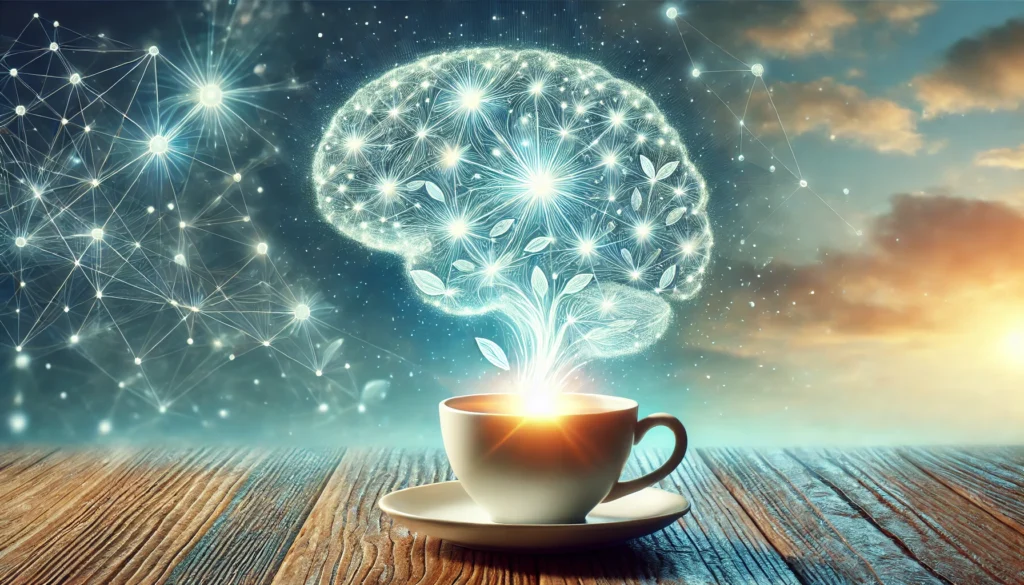Understanding Brain Fog and Its Cognitive Impact
Brain fog is a term that encapsulates a range of cognitive impairments, including memory lapses, difficulty concentrating, and mental fatigue. It is not a medical condition but rather a symptom of underlying issues such as stress, poor sleep, nutritional deficiencies, or hormonal imbalances. Many people experience brain fog as a consequence of modern lifestyles, which often involve high levels of stress, inadequate rest, and excessive exposure to digital screens. This mental haziness can hinder productivity and diminish overall well-being, making it a critical issue to address for those seeking to enhance cognitive function.
You may also like: Best L-Theanine Supplements for Cognitive Clarity: Benefits, Dosage, and Anxiety Relief
One of the most effective natural remedies for brain fog is the use of tea amino acids, particularly L-theanine. This compound, found primarily in tea leaves, has gained recognition for its ability to improve focus, mental clarity, and relaxation without causing drowsiness. Unlike caffeine, which can lead to jitters and energy crashes, L-theanine promotes a calm yet alert state of mind. Its cognitive benefits make it an attractive option for individuals looking to optimize their mental performance. By understanding how L-theanine works and how to incorporate it effectively, individuals can harness its potential to combat brain fog and enhance cognitive function.

The Role of Tea Amino Acids in Cognitive Function
Tea leaves contain a variety of amino acids, but L-theanine stands out for its unique effects on the brain. This amino acid influences neurotransmitter activity, promoting a balance between relaxation and alertness. While caffeine stimulates the nervous system by blocking adenosine, L-theanine enhances the production of gamma-aminobutyric acid (GABA), serotonin, and dopamine—neurotransmitters associated with mood regulation, relaxation, and cognitive function. This dual action makes tea amino acids particularly effective in alleviating brain fog without inducing drowsiness or over-stimulation.
The synergy between L-theanine and caffeine is another reason why tea is a superior cognitive enhancer. Unlike coffee, which provides a rapid spike in alertness followed by a crash, tea delivers sustained energy due to the interaction between these compounds. L-theanine modulates the effects of caffeine, preventing the common side effects of nervousness and restlessness. This balanced stimulation allows for prolonged mental clarity and focus, making tea an excellent choice for those who require sustained cognitive performance throughout the day.
Beyond neurotransmitter modulation, tea amino acids also contribute to neuroprotection. L-theanine has been shown to support brain health by reducing oxidative stress and inflammation, both of which are associated with cognitive decline and neurodegenerative diseases. By enhancing the brain’s resilience to stressors, tea amino acids offer long-term benefits beyond immediate cognitive enhancement. This makes L-theanine a valuable tool not only for individuals struggling with brain fog but also for those looking to maintain cognitive vitality as they age.
L-Theanine and Its Mechanism of Action in the Brain
L-theanine’s impact on cognitive function is primarily attributed to its ability to cross the blood-brain barrier and directly influence neural activity. One of its key mechanisms is the promotion of alpha brain waves, which are associated with a relaxed but alert state. Alpha waves typically occur during meditation and light creative activities, indicating a state of mental flow where focus and relaxation coexist. This unique ability to enhance cognition without causing overstimulation makes L-theanine an exceptional nootropic for individuals seeking mental clarity.
Additionally, L-theanine influences the balance of excitatory and inhibitory neurotransmitters. Excess glutamate activity in the brain can lead to overstimulation and mental fatigue, contributing to brain fog. By increasing GABA levels, L-theanine counteracts this effect, fostering a calm yet focused mental state. This is particularly beneficial for individuals experiencing cognitive impairment due to chronic stress, as stress-related neurotransmitter imbalances are a major contributor to brain fog.
Another notable aspect of L-theanine’s action is its role in neuroplasticity. Research suggests that this amino acid supports brain-derived neurotrophic factor (BDNF), a protein essential for learning, memory formation, and overall brain health. By enhancing neuroplasticity, L-theanine helps improve cognitive resilience, allowing the brain to adapt more efficiently to new information and challenges. This neuroprotective property makes it a valuable tool not only for addressing brain fog but also for long-term cognitive enhancement.
Best Tea Sources of L-Theanine
Different types of tea contain varying levels of L-theanine, making some varieties more effective for cognitive support than others. Green tea, matcha, and white tea are among the richest sources of this beneficial amino acid. Understanding the differences between these teas can help individuals choose the most suitable option for their cognitive needs.
Green tea is one of the most widely consumed sources of L-theanine and offers a balanced combination of this amino acid and caffeine. This synergy provides a gentle boost in alertness without the drawbacks of overstimulation. Matcha, a powdered form of green tea, contains even higher concentrations of L-theanine due to the way it is cultivated. Shade-grown tea plants produce more L-theanine to compensate for reduced sunlight exposure, making matcha an excellent choice for those seeking maximum cognitive benefits.
White tea also contains significant amounts of L-theanine but with lower caffeine content compared to green tea. This makes it a great option for individuals sensitive to caffeine who still want to experience the cognitive-enhancing effects of tea amino acids. Since white tea undergoes minimal processing, it retains a high concentration of its natural compounds, including antioxidants that further support brain health.
For those looking for a caffeine-free alternative, decaffeinated green tea still retains substantial amounts of L-theanine, making it a suitable option for evening consumption. This allows individuals to enjoy the cognitive benefits of tea amino acids without disrupting their sleep patterns. By selecting the right type of tea based on personal tolerance and cognitive needs, individuals can maximize the effectiveness of L-theanine in combating brain fog.
Optimizing L-Theanine Intake for Maximum Cognitive Benefits
To fully harness the benefits of L-theanine, it is essential to consider factors such as dosage, timing, and complementary compounds. Studies suggest that doses ranging from 100 to 200 mg of L-theanine are effective for promoting focus and relaxation. While a typical cup of green tea contains around 20 to 40 mg of L-theanine, consuming multiple servings or supplementing with purified L-theanine can enhance its effects.
Timing is another critical factor in optimizing L-theanine’s benefits. Since it promotes both relaxation and alertness, it is best consumed during periods of cognitive demand. Morning and early afternoon intake aligns well with natural circadian rhythms, supporting sustained focus throughout the day. Pairing L-theanine with caffeine in a 2:1 ratio has been shown to enhance cognitive performance while minimizing the side effects associated with caffeine alone.
Furthermore, combining L-theanine with other nootropics such as citicoline or rhodiola rosea can further amplify its cognitive benefits. Citicoline supports acetylcholine production, a neurotransmitter essential for memory and learning, while rhodiola rosea combats mental fatigue by enhancing stress resilience. By strategically combining these compounds, individuals can create a personalized nootropic stack tailored to their cognitive needs.

Frequently Asked Questions (FAQ) About L-Theanine and Tea Amino Acids
1. How does l-theanine affect cognitive function and mental clarity?
L-theanine, a unique compound found in the l-theanine plant, is known for its cognitive-enhancing properties. It promotes increased alpha brain wave activity, which is associated with a state of relaxed alertness. Many individuals report improved focus, reduced mental fog, and better problem-solving abilities when consuming tea amino acids regularly. Unlike stimulants that cause jitters or energy crashes, l-theanine provides a steady boost in mental performance without negative side effects. When combined with caffeine, as found in green tea, it creates a synergistic effect that enhances both concentration and relaxation simultaneously.
2. Can l-theanine help with sleep without causing daytime drowsiness?
L-theanine is widely recognized for its ability to promote relaxation without sedation. Research indicates that tea amino acids help regulate neurotransmitters like GABA and serotonin, which play a crucial role in reducing stress and improving sleep quality. Unlike traditional sleep aids that can lead to grogginess, l-theanine supports natural sleep cycles, making it easier to fall and stay asleep without impairing next-day function. Many people who struggle with stress-induced insomnia find that consuming l-theanine from the l-theanine plant before bed significantly improves their sleep patterns. This makes it an excellent option for those looking to enhance sleep quality while maintaining alertness during the day.
3. How does l-theanine impact stress and anxiety levels?
Studies show that l-theanine from the l-theanine plant has powerful anxiolytic effects, helping to reduce stress and anxiety without causing drowsiness. It works by modulating cortisol levels, the hormone responsible for the body’s stress response. Tea amino acids contribute to a calm yet focused state, making them useful for individuals dealing with high-pressure situations or generalized anxiety. Many users report that regular consumption leads to a noticeable decrease in nervous tension, allowing them to navigate stressful environments more effectively. Unlike pharmaceutical options, l-theanine provides these benefits naturally and without unwanted side effects.
4. Is l-theanine beneficial for heart health?
Yes, l-theanine may support cardiovascular health in multiple ways. Research suggests that tea amino acids contribute to lower blood pressure levels by promoting relaxation and improving circulation. L-theanine also exhibits antioxidant properties, which help protect blood vessels from oxidative stress and inflammation. Regular consumption of the l-theanine plant has been linked to reduced risk factors associated with heart disease, such as hypertension and arterial stiffness. Furthermore, it may help mitigate the adverse effects of stress on the cardiovascular system, making it a valuable addition to a heart-healthy diet.
5. Can l-theanine improve gut health and digestion?
Recent studies suggest a strong connection between l-theanine, tea amino acids, and gut health. L-theanine influences the gut-brain axis by modulating neurotransmitters that affect digestive function. Many individuals who consume the l-theanine plant regularly experience reduced symptoms of digestive discomfort, such as bloating and indigestion. Additionally, l-theanine’s calming effects may help alleviate stress-related digestive issues, including irritable bowel syndrome (IBS). Its ability to balance the nervous system contributes to a healthier gut microbiome, supporting overall digestive wellness.
6. How does l-theanine interact with caffeine?
L-theanine and caffeine, often found together in tea amino acids, create a unique synergy that enhances cognitive performance. The l-theanine plant naturally contains both compounds, leading to increased focus, sustained energy, and reduced jitteriness compared to consuming caffeine alone. This combination is particularly beneficial for individuals sensitive to caffeine, as l-theanine counteracts the overstimulation that caffeine can cause. Many people use this pairing to improve productivity, as it provides steady mental energy without sudden crashes. This makes tea amino acids an ideal alternative to coffee for those looking for balanced stimulation.
7. Are there any side effects associated with l-theanine consumption?
L-theanine is considered extremely safe and well-tolerated by most individuals. Because it is naturally derived from the l-theanine plant, it does not typically cause adverse effects when consumed in reasonable amounts. Unlike synthetic relaxants, tea amino acids do not lead to dependency or withdrawal symptoms. However, excessive intake may result in mild dizziness or lowered blood pressure in sensitive individuals. It is always advisable to start with moderate doses and observe how your body responds before increasing consumption.
8. Can l-theanine support immune function?
Yes, l-theanine has been shown to positively influence immune health. Research indicates that tea amino acids enhance the body’s natural defense mechanisms by increasing the production of infection-fighting cells. The l-theanine plant contains compounds that help regulate immune responses, reducing inflammation and improving resilience against pathogens. Regular consumption may also contribute to faster recovery from illnesses such as colds and flu. By lowering stress levels, l-theanine further supports immune function, as chronic stress is known to weaken the immune system.
9. How can l-theanine be incorporated into a daily routine?
There are multiple ways to enjoy the benefits of l-theanine and tea amino acids daily. Drinking green or black tea is the most traditional method, as the l-theanine plant is a natural source of these compounds. For those looking for higher doses, l-theanine supplements are available in capsule or powder form. Many individuals take l-theanine in the morning to enhance focus or in the evening to promote relaxation. It can also be combined with adaptogens, such as ashwagandha, for additional stress-reducing effects. Regardless of the method, consistent intake is key to experiencing its full range of benefits.
10. What makes l-theanine from tea superior to synthetic alternatives?
L-theanine derived from the l-theanine plant is often preferred over synthetic versions due to its natural composition and additional beneficial compounds. Tea amino acids from whole tea leaves provide a balanced profile of bioactive compounds, enhancing their overall effectiveness. Natural sources of l-theanine also contain polyphenols and catechins, which contribute to their health benefits, particularly for heart and brain health. While synthetic l-theanine can be effective, it may lack the nuanced benefits that come from consuming whole-plant extracts. Choosing tea-based sources ensures that you receive the full spectrum of naturally occurring nutrients.

Conclusion: Unlocking Mental Clarity with Tea Amino Acids
L-theanine, a key tea amino acid, offers a unique approach to combating brain fog by promoting a relaxed yet alert state of mind. Its ability to modulate neurotransmitters, enhance alpha brain wave activity, and support neuroplasticity makes it an exceptional cognitive enhancer. By choosing the right tea sources and optimizing intake, individuals can harness the full potential of L-theanine to achieve sustained focus, mental clarity, and overall cognitive well-being. As more people seek natural solutions to enhance mental performance, the role of tea amino acids in cognitive health will continue to gain recognition, solidifying their place in the realm of nootropic nutrition.
natural nootropics, cognitive enhancement, brain fog remedies, tea for mental clarity, L-theanine benefits, best tea for focus, amino acids in tea, green tea cognition, matcha brain health, L-theanine and caffeine, neuroprotection with tea, tea for stress relief, focus-boosting supplements, brain function optimization, herbal brain boosters, nootropic tea benefits, best amino acids for the brain, tea and neurotransmitters, mental clarity supplements, how L-theanine works
Further Reading:
Here’s What You Need To Know About L-Theanine
Amino Acids for Focus and Attention
Important Note: The information contained in this article is for general informational purposes only, and should not be construed as health or medical advice, nor is it intended to diagnose, prevent, treat, or cure any disease or health condition. Before embarking on any diet, fitness regimen, or program of nutritional supplementation, it is advisable to consult your healthcare professional in order to determine its safety and probable efficacy in terms of your individual state of health.
Regarding Nutritional Supplements Or Other Non-Prescription Health Products: If any nutritional supplements or other non-prescription health products are mentioned in the foregoing article, any claims or statements made about them have not been evaluated by the U.S. Food and Drug Administration, and such nutritional supplements or other health products are not intended to diagnose, treat, cure, or prevent any disease.


